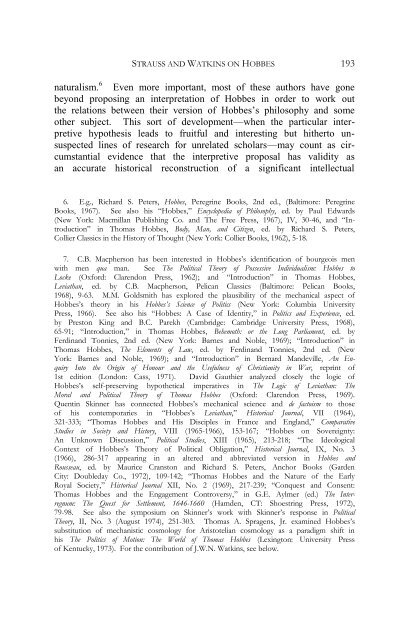Strauss and Watkins on Hobbes' Political Philosophy: A Review
Strauss and Watkins on Hobbes' Political Philosophy: A Review
Strauss and Watkins on Hobbes' Political Philosophy: A Review
You also want an ePaper? Increase the reach of your titles
YUMPU automatically turns print PDFs into web optimized ePapers that Google loves.
STRAUSS AND WATKINS ON HOBBES 193<br />
naturalism. 6 Even more important, most of these authors have g<strong>on</strong>e<br />
bey<strong>on</strong>d proposing an interpretati<strong>on</strong> of Hobbes in order to work out<br />
the relati<strong>on</strong>s between their versi<strong>on</strong> of Hobbes’s philosophy <str<strong>on</strong>g>and</str<strong>on</strong>g> some<br />
other subject. This sort of development—when the particular inter-<br />
pretive hypothesis leads to fruitful <str<strong>on</strong>g>and</str<strong>on</strong>g> interesting but hitherto un-<br />
suspected lines of research for unrelated scholars—may count as cir-<br />
cumstantial evidence that the interpretive proposal has validity as<br />
an accurate historical rec<strong>on</strong>structi<strong>on</strong> of a significant intellectual<br />
6. E.g., Richard S. Peters, Hobbes, Peregrine Books, 2nd ed., (Baltimore: Peregrine<br />
Books, 1967). See also his “Hobbes,” Encyclopedia of <strong>Philosophy</strong>, ed. by Paul Edwards<br />
(New York: Macmillan Publishing Co. <str<strong>on</strong>g>and</str<strong>on</strong>g> The Free Press, 1967), IV, 30-46, <str<strong>on</strong>g>and</str<strong>on</strong>g> “In-<br />
troducti<strong>on</strong>” in Thomas Hobbes, Body, Man, <str<strong>on</strong>g>and</str<strong>on</strong>g> Citizen, ed. by Richard S. Peters,<br />
Collier Classics in the History of Thought (New York: Collier Books, 1962), 5-18.<br />
7. C.B. Macphers<strong>on</strong> has been interested in Hobbes’s identificati<strong>on</strong> of bourgeois men<br />
with men qua man. See The <strong>Political</strong> Theory of Possessive Individualism: Hobbes to<br />
Locke (Oxford: Clarend<strong>on</strong> Press, 1962); <str<strong>on</strong>g>and</str<strong>on</strong>g> “Introducti<strong>on</strong>” in Thomas Hobbes,<br />
Leviathan, ed. by C.B. Macphers<strong>on</strong>, Pelican Classics (Baltimore: Pelican Books,<br />
1968), 9-63. M.M. Goldsmith has explored the plausibility of the mechanical aspect of<br />
Hobbes’s theory in his Hobbes’s Science of Politics (New York: Columbia University<br />
Press, 1966). See also his “Hobbes: A Case of Identity,” in Politics <str<strong>on</strong>g>and</str<strong>on</strong>g> Experience, ed.<br />
by Prest<strong>on</strong> King <str<strong>on</strong>g>and</str<strong>on</strong>g> B.C. Parekh (Cambridge: Cambridge University Press, 1968),<br />
65-91; “Introducti<strong>on</strong>,” in Thomas Hobbes, Behemoth: or the L<strong>on</strong>g Parliament, ed. by<br />
Ferdin<str<strong>on</strong>g>and</str<strong>on</strong>g> T<strong>on</strong>nies, 2nd ed. (New York: Barnes <str<strong>on</strong>g>and</str<strong>on</strong>g> Noble, 1969); “Introducti<strong>on</strong>” in<br />
Thomas Hobbes, The Elements of Law, ed. by Ferdin<str<strong>on</strong>g>and</str<strong>on</strong>g> T<strong>on</strong>nies, 2nd ed. (New<br />
York: Barnes <str<strong>on</strong>g>and</str<strong>on</strong>g> Noble, 1969); <str<strong>on</strong>g>and</str<strong>on</strong>g> “Introducti<strong>on</strong>” in Bernard M<str<strong>on</strong>g>and</str<strong>on</strong>g>eville, An En-<br />
quiry Into the Origin of H<strong>on</strong>our <str<strong>on</strong>g>and</str<strong>on</strong>g> the Usefulness of Christianity in War, reprint of<br />
1st editi<strong>on</strong> (L<strong>on</strong>d<strong>on</strong>: Cass, 1971). David Gauthier analyzed closely the logic of<br />
Hobbes’s self-preserving hypothetical imperatives in The Logic of Leviathan: The<br />
Moral <str<strong>on</strong>g>and</str<strong>on</strong>g> <strong>Political</strong> Theory of Thomas Hobbes (Oxford: Clarend<strong>on</strong> Press, 1969).<br />
Quentin Skinner has c<strong>on</strong>nected Hobbes’s mechanical science <str<strong>on</strong>g>and</str<strong>on</strong>g> de factoism to those<br />
of his c<strong>on</strong>temporaries in “Hobbes’s Leviathan,” Historical Journal, VII (1964),<br />
321-333; “Thomas Hobbes <str<strong>on</strong>g>and</str<strong>on</strong>g> His Disciples in France <str<strong>on</strong>g>and</str<strong>on</strong>g> Engl<str<strong>on</strong>g>and</str<strong>on</strong>g>,” Comparative<br />
Studies in Society <str<strong>on</strong>g>and</str<strong>on</strong>g> History, VIII (1965-1966), 153-167; “Hobbes <strong>on</strong> Sovereignty:<br />
An Unknown Discussi<strong>on</strong>,” <strong>Political</strong> Studies, XIII (1965), 213-218; “The Ideological<br />
C<strong>on</strong>text of Hobbes’s Theory of <strong>Political</strong> Obligati<strong>on</strong>,” Historical Journal, IX, No. 3<br />
(1966), 286-317 appearing in an altered <str<strong>on</strong>g>and</str<strong>on</strong>g> abbreviated versi<strong>on</strong> in Hobbes <str<strong>on</strong>g>and</str<strong>on</strong>g><br />
Rousseau, ed. by Maurice Cranst<strong>on</strong> <str<strong>on</strong>g>and</str<strong>on</strong>g> Richard S. Peters, Anchor Books (Garden<br />
City: Doubleday Co., 1972), 109-142; “Thomas Hobbes <str<strong>on</strong>g>and</str<strong>on</strong>g> the Nature of the Early<br />
Royal Society,” Historical Journal XII, No. 2 (1969), 217-239; “C<strong>on</strong>quest <str<strong>on</strong>g>and</str<strong>on</strong>g> C<strong>on</strong>sent:<br />
Thomas Hobbes <str<strong>on</strong>g>and</str<strong>on</strong>g> the Engagement C<strong>on</strong>troversy,” in G.E. Aylmer (ed.) The Inter-<br />
regnum: The Quest for Settlement, 1646-1660 (Hamden, CT: Shoestring Press, 1972),<br />
79-98. See also the symposium <strong>on</strong> Skinner’s work with Skinner’s resp<strong>on</strong>se in <strong>Political</strong><br />
Theory, II, No. 3 (August 1974), 251-303. Thomas A. Spragens, Jr. examined Hobbes’s<br />
substituti<strong>on</strong> of mechanistic cosmology for Aristotelian cosmology as a paradigm shift in<br />
his The Politics of Moti<strong>on</strong>: The World of Thomas Hobbes (Lexingt<strong>on</strong>: University Press<br />
of Kentucky, 1973). For the c<strong>on</strong>tributi<strong>on</strong> of J.W.N. <str<strong>on</strong>g>Watkins</str<strong>on</strong>g>, see below.
















